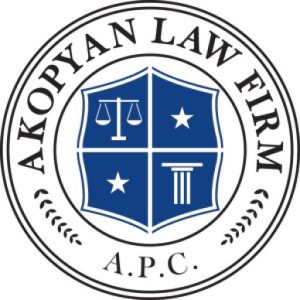Lemon Grove Employment Law Attorneys
Employment Litigation in Lemon Grove, California
Lemon Grove is a small but vibrant community nestled between San Diego and La Mesa. Known for its sunny climate, welcoming neighborhoods, and the famous giant lemon that greets visitors downtown, the city combines suburban comfort with deep historical roots. With a population of about 27,000 residents, Lemon Grove retains a sense of close community while participating in the broader economic life of San Diego County.
Lemon Grove’s history stretches back to the late 1800s, when it was established as an agricultural settlement surrounded by citrus groves and farmland. The city officially incorporated in 1977, making it one of the county’s younger municipalities. Though its agricultural past is still reflected in its name and symbols, today Lemon Grove is home to a diverse economy that includes education, healthcare, construction, retail, and local government.
Akopyan Law Firm, A.P.C. represents employees and employers in Lemon Grove in all types of employment disputes. Our attorneys are experienced litigators who practice exclusively in the field of employment law, providing skilled representation in court and at every stage of the litigation process.
Employment Law in Lemon Grove
Employment relationships in Lemon Grove are subject to the same complex set of California labor and employment laws that govern workplaces throughout the state. These laws regulate everything from termination and compensation to workplace conduct, discrimination, harassment, and retaliation. When conflicts arise, they often require skilled legal advocacy to reach a resolution.
Akopyan Law Firm handles employment litigation across Lemon Grove and the surrounding region. Our attorneys represent clients in wrongful termination, discrimination, harassment, retaliation, and wage-and-hour cases. Each matter is approached with careful preparation and a strategic focus on achieving meaningful results through negotiation, arbitration, or trial.
Representation for Lemon Grove Employees
Employees form the backbone of Lemon Grove’s local economy, from teachers and healthcare workers to small-business staff and public employees. When workplace rights are violated, those workers deserve capable legal representation to help them pursue justice under the law.
Akopyan Law Firm stands with employees in Lemon Grove who have experienced wrongful termination, harassment, discrimination, retaliation, or wage violations. We understand how much is at stake in these cases — reputations, livelihoods, and futures — and we fight to protect our clients’ rights with professionalism and determination.
Litigation for Lemon Grove Employers
Lemon Grove’s business community includes small family enterprises, service providers, contractors, and regional employers. Regardless of size or industry, any business can face employment litigation. Lawsuits involving wrongful termination, discrimination, or wage disputes can be disruptive and costly, requiring experienced attorneys to navigate the process effectively.
Akopyan Law Firm represents employers in Lemon Grove who are defending against employment-related claims. Our attorneys have the trial experience and legal knowledge necessary to manage litigation efficiently and strategically, protecting our clients’ interests while pursuing favorable resolutions.
Lemon Grove’s Community and Workforce
Lemon Grove’s appeal lies in its balance — it’s small enough to retain a friendly, local character but large enough to sustain a diverse economy. Its central location in East County makes it both a residential haven and a workplace for many who commute to nearby cities. The mix of local businesses, schools, and public agencies creates a dynamic employment environment where legal disputes can arise in many forms.
Akopyan Law Firm understands this community and its workforce. Our litigation practice is built on advocating for individuals and businesses across all sectors, providing strong representation rooted in real-world experience and a deep understanding of California employment law.
Contact Akopyan Law Firm, A.P.C.
If you are involved in an employment dispute in Lemon Grove, Akopyan Law Firm can help. Our attorneys devote their practice entirely to employment litigation and have extensive experience representing both employees and employers in courts throughout Southern California.
To discuss your situation or schedule a confidential consultation, contact Akopyan Law Firm, A.P.C. today. Our team is dedicated to delivering skilled advocacy and effective results in every employment law matter we handle.
We Can Help Lemon Grove Residents With Cases Involving:
Featured Article:
Retaliation Concerns After Requesting Family Medical Leave and the Risk of Wrongful Termination in California
📌 Key Takeaways Retaliation worries after family medical leave often begin with subtle workplace shifts and can grow into serious fear of wrongful termination. Watch Early Behavior Shifts: Remarks about “reliability,” jokes about being “sick again,” and new public criticism after a leave request can signal changing attitudes toward commitment. Track New Discipline Patterns: A sudden wave of write-ups, counseling sessions, and attendance warnings tied to medical needs can quietly set the stage for later employment decisions. Notice Punitive Schedule Changes: Losing long-standing schedules, overtime, or safer duties and being reassigned to nights, split shifts, or heavier work can feel like punishment after leave. See Termination As a Pattern: Suddenly negative evaluations, magnified minor rule violations, and worsening conditions that push someone to resign often cluster together in potential wrongful termination stories. Treat Legal Review As Time-Sensitive: Because retaliation questions are complex and strict deadlines may apply, workers often protect their interests by promptly consulting a California employment attorney. Retaliation concerns after family medical leave are usually about accumulating patterns, not single moments. Workers in physically demanding Southern California jobs will better recognize these warning patterns, preparing them for the detailed overview that follows. Requesting family medical leave can feel like a dangerous step when every shift matters to the household budget. When discipline, schedule changes, or termination follow soon after a leave request, many workers worry about a necessary medical absence being held against them. These concerns frequently arise for workers in physically demanding jobs in Southern California. Federal and California family and medical leave laws, together with anti-discrimination protections, may treat some leave-related requests and communications as protected activity. The scope of any protection depends on specific facts, and statutes and regulations are subject to change. Official government websites can provide current up to date information, but they do not replace individualized legal advice from a California employment lawyer. When Family Medical Leave Feels Risky for California Workers in Physically Demanding Jobs Workers in construction, warehouse operations, production lines, manufacturing, retail, food service, landscaping, and delivery often support entire households on modest wages. A serious injury, surgery, or a family member’s medical crisis can make time away from work unavoidable, yet requesting family medical leave may feel dangerous when rent, groceries, and childcare depend on steady hours. Feelings of guilt about missed shifts and anxiety about being labeled unreliable can grow quickly, especially when treatment at work seems to change after a leave request. Everyday Workplace Changes That Can Raise Retaliation Concerns Retaliation can appear in ways other than immediate firing. Often, the first signs show up in day-to-day treatment after a worker asks for time off related to a serious health condition or caregiving responsibility. Sudden Negative Treatment After a Leave Request A previously steady relationship with a supervisor may begin to feel strained. Remarks about “reliability,” jokes about being “sick again,” sighs when medical appointments are mentioned, or new public criticism can create a sense that commitment is being questioned. When this change appears soon... Read more
Wrongful Termination After Family Medical Leave in California Retail, Restaurant, and Hospitality Jobs
📌 Key Takeaways Termination after family medical leave in California’s retail, restaurant, and hospitality jobs often raises serious questions about disability rights, retaliation, and job protection. Front-Line Workers At Risk: Workers in front-line store, restaurant, and hotel roles often face sudden termination after taking time off for serious health conditions or caregiving. Laws Protect Medical Leave: Federal and California laws like FMLA, CFRA, FEHA, and the ADA aim to protect eligible employees who use qualifying family medical leave. Red Flags After Return: Sharp schedule cuts, sudden write-ups, or claims that medical appointments are too disruptive, especially when others take similar roles, can signal retaliation concerns. Industry Pressures Create Vulnerability: Tight staffing, fluctuating customer demand, and pressure to keep labor costs low can push managers to sideline workers who needed legally protected time away. Legal Review Clarifies What Happened: A California employment attorney can review timelines, documents, and workplace behavior to assess whether termination reflects lawful business reasons or potential legal violations. When family medical leave collides with sudden job loss, the story in schedules, comments, and timing often matters as much as the paperwork. California retail, restaurant, and hospitality workers facing termination after family medical leave will see their own experiences reflected here, preparing them for the detailed overview that follows. For many California retail, restaurant, and hospitality workers, family medical leave becomes necessary after a serious health condition or a major medical event affecting a close family member. When a job suddenly disappears right after that leave, the experience can feel shocking and deeply unfair. In some situations, this kind of job loss may be connected to wrongful termination, disability discrimination, or retaliation for using protected family medical leave. Who This Happens to in Retail, Restaurant, and Hospitality Work In Southern California, these problems often affect the people who keep stores, restaurants, and hotels running from the ground up. Cashiers, stockers, sales associates, warehouse floor workers, servers, bussers, line cooks, dishwashers, baristas, hotel housekeepers, front-desk clerks, banquet staff, and porters spend long hours on their feet, lifting, bending, and moving quickly under pressure. A back or leg injury, surgery, chronic illness, or other serious medical condition can make that physical work extremely difficult. Many workers also carry responsibility for a spouse, child, or parent with serious health conditions. When a worker uses family medical leave or asks for time away to care for a loved one, the paycheck at stake often supports rent, food, and basic bills for the entire household. When termination follows soon after that leave, many workers report feeling shocked, angry, and ashamed, wondering whether asking for time away was a mistake. This combination of physical strain, caregiving duties, and sudden job loss is exactly where family medical leave and disability protections often come into play. Family Medical Leave and Serious Health Conditions – A High-Level Overview Federal and California laws, including the Family and Medical Leave Act (FMLA) and the California Family Rights Act (CFRA) aim to protect eligible employees who need time off... Read more
Fired After Family Medical Leave? What California Warehouse and Production Line Workers Should Know
Why Warehouse and Production Workers Are Especially Vulnerable After Family or Medical Leave Warehouse and production jobs in Southern California typically combine heavy physical work with strict production pressure. A picker, packer, forklift operator, machine operator, or assembler may spend long shifts lifting boxes, moving pallets, and working beside conveyor belts with scanners and timeclocks tracking every minute. When a back, shoulder, leg, or similar bodily injury occurs, or when a close family member faces a serious health condition, family or medical leave can become unavoidable rather than optional. Under California law, and under related federal legal frameworks, some workers may receive protections when they take family and medical leave for serious health conditions or qualifying family needs. Those legal frameworks typically focus on ensuring that workers are not punished simply because they needed protected time away from work. At the same time, employers in high-pressure warehouse environments often prioritize staffing levels, quotas, and speed, which can create tension between production goals and protected leave. What Termination After Family Medical Leave Looks Like on the Warehouse Floor Termination after family or medical leave rarely appears out of nowhere. Many warehouse and production workers describe a sequence of events that begins when they mention a surgery, medical recovery, or a family member’s serious health condition. A long-time worker with a clean record may suddenly receive write-ups for minor issues shortly after requesting time away for surgery. A supervisor who once praised reliability may begin documenting attitude problems or “not being a team player” only after the worker explains that heavy lifting is unsafe for a period of time. Common patterns can include: Replacement of the worker on the line while the worker is still on leave, with a later statement that the position has been “eliminated,” even though similar roles continue. A return from leave followed almost immediately by termination for vague reasons such as “not a good fit” or “business needs,” while the employer continues to hire for comparable positions. Reassignment on return to overwhelmingly harsh shifts or tasks that disregard disability-related restrictions, followed by termination for “performance” when the worker cannot meet those demands. These patterns can create confusion and embarrassment, especially for workers who followed procedures, kept supervisors informed, and expected their past loyalty to count for something. When a Firing After Family Medical Leave May Cross the Line California employment law can, in certain circumstances, protect workers from adverse employment actions that are motivated by the worker’s need for or use of protected family or medical leave. Termination decisions can be complex, and no single fact automatically establishes that a firing is unlawful. However, particular red flags may suggest that the stated reason for termination is not the full picture of the employer’s motivation. Examples of potential warning signs include: A previously strong record that is followed by a sudden wave of discipline only after leave is requested or taken. Comments that connect frustration directly to the worker’s absence, recovery time, or future medical appointments. A... Read more









Millions of Dollars Recovered For Our Clients
Check Out Our Case Results





